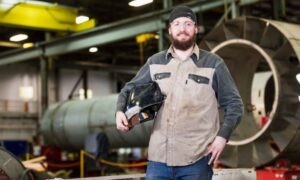
Noise pollution is a significant health and safety hazard in metal fabrication facilities. Metalworking processes, such as sawing, pressing, and grinding, generate a variety of noises that contribute to this hazardous environment. This makes noise control for industrial ventilation systems essential for your shop.
Exposure to chronic loud noise levels exceeding 90 decibels can lead to permanent hearing loss, tinnitus, and other detrimental health effects. Excessive noise can also hinder communication, increase stress and fatigue, and ultimately decrease worker productivity.
This is why effective noise management strategies are crucial to protect worker health while also optimizing production efficiency. Eldridge is a leader in industrial ventilation and noise control solutions. We can assess your specific needs and design a custom acoustic solution that helps your facility meet OSHA noise exposure standards.
Contact us now to learn how we can help you create a quieter and healthier work environment in your metal fabrication shop.
Understanding Noise Pollution in Metal Fabrication
Metal fabrication shops present a complex acoustic environment with various noise sources. Continuous noise, such as the hum of machinery or fans, can be particularly fatiguing. Impulsive noises, like those generated by stamping or hammering, can be startling and damaging to hearing. Tonal noises, characterized by a distinct pitch (e.g., grinding), are often more annoying than broadband noises, which encompass a wider range of frequencies (e.g., sawing).
Sound is measured in decibels (dB), a logarithmic unit that reflects the intensity of sound waves perceived by the human ear. Higher dB levels indicate louder noises. Specific metalworking processes are known to generate particularly high noise levels. Saws, for example, can produce noise exceeding 100 dB. Presses can reach similar levels depending on their size and operation. Grinding processes create a combination of loud noises and high-frequency vibrations that can further contribute to hearing loss.
The size and layout of a metal fabrication shop can also influence the overall noise environment. Reverberation, the persistence of sound waves bouncing off surfaces, can amplify noise levels in large, open spaces. Echo, the delayed reflection of sound, can further distort communication and create a chaotic soundscape. Implementing noise control for industrial ventilation systems can help reduce the impact of all these factors.
The Impact of Noise on Workers’ Health and Safety
Chronic exposure to loud noise levels in metal fabrication facilities poses a significant threat to worker health and safety. The most concerning consequence is noise-induced hearing loss (NIHL), a permanent and irreversible condition that damages the delicate hair cells within the inner ear responsible for sound perception. NIHL can begin with difficulty hearing high-frequency sounds, progressing to an inability to understand speech and requiring hearing aids in severe cases.
Beyond hearing loss, excessive noise exposure has a range of detrimental health effects. Workers in noisy environments often experience tinnitus, a constant ringing or buzzing in the ears, which can disrupt sleep, concentration, and overall well-being.
Chronic noise exposure can contribute to increased stress levels, leading to headaches, anxiety, and even high blood pressure. Fatigue can also be a common consequence of working in loud environments, impacting worker morale, alertness, and productivity.
The negative effects of noise extend beyond individual worker health. Communication difficulties become a major challenge in noisy shops. Workers may struggle to hear instructions, safety warnings, or calls for assistance, increasing the risk of accidents and injuries.
OSHA sets noise exposure limits to protect workers from these health and safety hazards. These regulations mandate employers to implement hearing conservation programs when noise levels exceed a certain threshold. Integrating noise control with your industrial ventilation systems not only ensures compliance with regulations, but also demonstrates a commitment to your employees’ well-being.
Industrial Ventilation System Design with Noise Control
In a metal fabrication shop, your industrial ventilation system is required for dust and fume control, but it can also be strategically designed to contribute to noise mitigation. Here are some ways of incorporating noise control components into your ventilation system:
Enclosure Design
Source Capture: Whenever possible, enclose noise-generating machinery at its source. This traps noise closest to its origin, preventing it from dispersing throughout the shop.
Duct Design: Utilize lined ducts with sound-absorbing materials (e.g., fiberglass insulation, acoustic panels) along the length of the ductwork. This dampens noise traveling through the ducts to the exhaust fans.
Fan Selection: Consider low-noise exhaust fans. Look for fans with features like variable speed drives that allow operation at lower speeds when full power isn’t necessary, reducing noise generation.
System Integration
Silencers: Strategically place silencers within the ductwork system, particularly near sharp bends or transitions where noise can intensify. Silencers act like mufflers, absorbing sound waves and reducing overall noise output.
Discharge Location: Carefully consider the location of the ventilation system’s discharge point. Avoid directing noisy exhaust airflows towards occupied work areas or property lines.
Additional Considerations for Noise Control
Isolation Techniques: Implement vibration dampers on machinery bases to isolate and prevent noise transmission through the shop floor.
Maintenance: Regularly inspect and maintain ventilation system components, including ducts, fans, and silencers. Proper maintenance ensures optimal performance and minimizes noise generation due to wear and tear.
Reap the Benefits of Noise Control in Your Metal Fabrication Facility
Managing acoustics in metal fabrication facilities is not just about creating a quieter environment – it’s an investment in worker health, safety, and productivity.
Eldridge understands the unique challenges of noise control in metal fabrication. Our team are experts in noise control principles and ventilation system design. Contact us to schedule an assessment and optimize the acoustics in your shop long-term.
